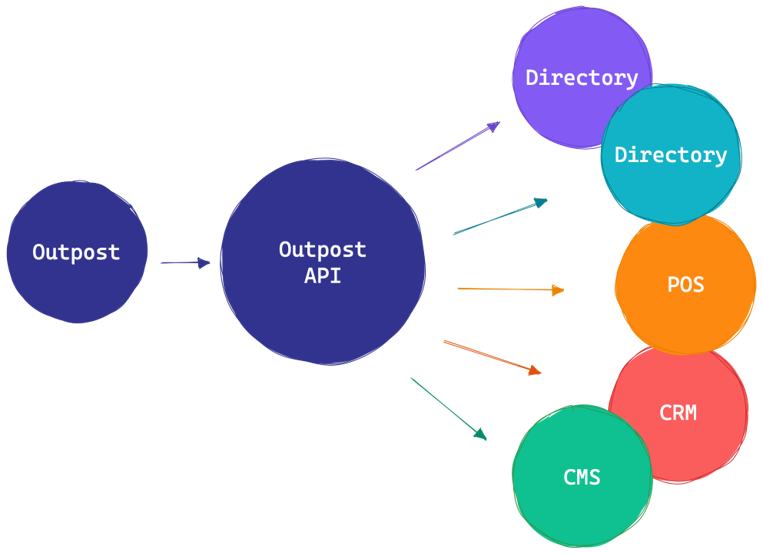Frequently asked questions
See also Scout FAQ and Outpost FAQ!
- I'm a developer looking to get started with Outpost
- Is there a demo?
- What sort of things can I do with Outpost Platform?
- I'm interested in using Outpost in my organisation but I would like to speak to someone first, who can I speak to?
- How compliant with Open Referral UK are you?
- What are the costs involved?
- How secure is the Outpost Platform?
- How easy is it to switch to Outpost?
- How can I keep up to date with development?
- Can you explain in lay-person's terms what is required to have a functioning community directory – do you need both Outpost and Drupal (or equivalent cms)?
I'm a developer looking to get started with Outpost
Each application, tool and utility has a For developers section. We would also recommend reading the other sections as they contain some context that may not be covered on the technical side.
Is there a demo?
We hope to produce a series of video tours but you're welcome to try out the applications yourself using the instructions on the homepage or if you would like to arrange a demonstration please see the Team page and get in touch.
What sort of things can I do with Outpost Platform?
We have created a page specifically to keep track of all the ideas we have had for the Outpost Platform; What can you do with the Outpost platform. Since the data is kept in one place you can send it anywhere!
I'm interested in using Outpost in my organisation but I would like to speak to someone first, who can I speak to?
There is a discussion board on the Outpost respository where you can ask any questions you might have, or if you prefer to speak to someone involved in the project please see the Team page.
How compliant with Open Referral UK are you?
Take a look at the Open referral UK section for more information on Open Referral Compliancy.
What are the costs involved?
Initial costs will be low but these will grow depending on how many users, applications within the Outpost Platform and your technical architecture. You can read more about costs here.
How secure is the Outpost Platform?
Outpost is written using Ruby on Rails a popular and widely used framework. You can read more about Security here.
How easy is it to switch to Outpost?
We have documentation available Importing data. We highly recommend using this opportunity to evaluate your data, we hope to expand our guide to data migration Things to think about to be as helpful as possible.
How can I keep up to date with development?
You can keep up to date with the current progress through the Outpost repository. Every sprint, the Outpost team write up a short sprintnote detailing what we have been up to in that sprint. It's part of our plan to work in the open to and it helps keep everyone informed about progress and what we're learning as we go. You can see our sprintnotes here: Sprintnotes
Can you explain in lay-person's terms what is required to have a functioning community directory – do you need both Outpost and Drupal (or equivalent cms)?
In order to have a directory you will need three things, Outpost, Outpost API and an application that can read Open Referral UK format.
Outpost and the Outpost API are the two core components
- Outpost is your backend, it gives you and service owners a place to add, edit and manage the service information
- Outpost API is where your chosen directory application (or other applications that need service information) will look for the data

The frontend or directory, the part which is accessed by residents, is completely up to you and your user requirements. The only requirement from the technology is that it can read the Open Referral UK format.
Buckinghamshire Council is using Scout to manage their ASC and FIS directories. Both directories are managed from one Outpost install, with both teams using the system. (Scout was created alongside Outpost and offers directory functionality based on all the previous directories TPX Impact have built.)
Royal Borough of Greenwich has chosen to use LocalGov Drupal for our community directory. This is because we are using the LocalGov Drupal in our website rebuild. We also wanted to include content pages alongside the service entries, combining LocalGov Drupal with Outpost service data lets us do this.